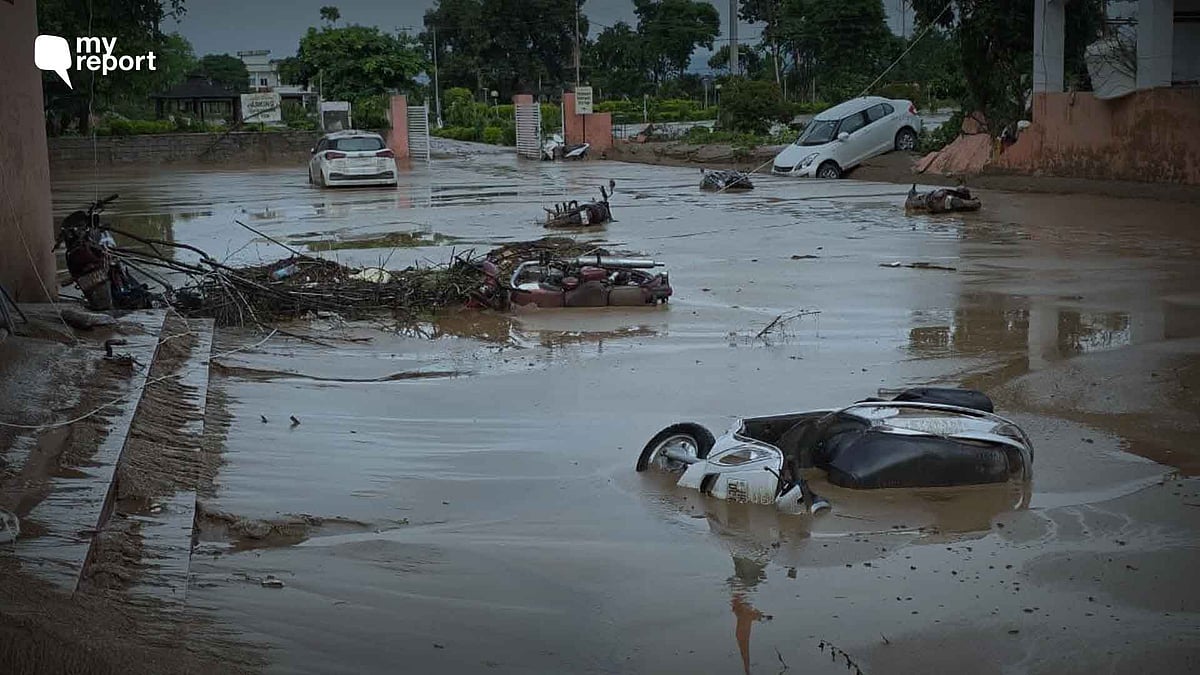
'Floods in Jammu are Proof That You Can’t Cage a River with Concrete'
As a climate activist, this tragedy feels heavier than sorrow because this wasn’t something we had been highlighting

advertisement
What I have seen in Jammu over the past two to three days—and what I am still seeing—is terrifying. As environmentalists and climate activists, we have been warning about such a disaster for the last three to four years. But every warning was ignored, and instead, the Tawi River Front Development Project was pushed forward.
For the past several days, there had been relentless rainfall here, and we feared the damage it could cause. The Tawi River had already begun to swell dangerously.
On 24 August, when India issued a flood alert to Pakistan as the Tawi waters kept rising, we knew immediately that Jammu was heading towards something far worse.
'Terrifying Swell Of Tawi River'
To see the reality with my own eyes, I went to the bridge built over the Tawi near Bhagwati Nagar. The sight of the river’s current and force left me shaken. That bridge near the point where the Nikki Tawi and Badi Tawi separate, and I cannot even begin to describe how much water was rushing through. It was beyond words. What was more shocking was that this was the very spot which, for most of the year, remains completely dry.
After seeing the terrifying force of the Tawi River from the Bhagwati Nagar bridge, I hurried back towards my home to warn families across neighbourhoods. But before I could even reach home, I received the shocking news: the very bridge I had just crossed had collapsed.
The water’s fury was unimaginable. It swept away everything in its path—houses, shops, vehicles. I tried my best to alert as many people as I could, but the destruction across Jammu city was widespread.
Areas like Peerkho, Rajendar Nagar, Lajpat Nagar near Canal Road, Balicharana, Durganagar, Gujjarnagar, Sainik Colony, Greater Kailash, Bathindi, and Basheer Basti were among the worst affected.
As per news reports, the devastation was even greater in the higher altitudes of Jammu. The death toll was already rising—41 lives lost at last count. Reading those numbers was heartbreaking; each one represented a family shattered.
As a climate activist, this tragedy feels heavier than sorrow because this was something we had been highlighting. We have been protesting and warning the government for years about projects like the Tawi River Front Development.
The damage is not just structural; it is deeply human. My own relatives, who live some distance from the Tawi, saw their homes submerged up to the first floor. Their ration supplies have been ruined. For families who lost entire homes and shops, the loss is incalculable. Generations work to build a single property, and in one sweep of water, it was all washed away.
And for those whose houses still stand near the riverbank, life is no less difficult. They are now struggling with the basics—food, clean water, and electricity. Survival itself has become a daily battle.
‘Climate Change is Real’
Standing amid this destruction, I am haunted by one thought: this disaster was not a surprise. It was a warning ignored. And Jammu is paying the price.
Less than a week ago, we had urged the authorities to reach out to the people of Jammu and educate them about evacuation methods. This is one of the most basic steps in preparing for and adapting to extreme weather events.
At the same time, our focus should be on building infrastructure that acknowledges the reality of climate change. We cannot afford to create structures that disrupt our rivers. Instead, we must design systems that can manage the rising water levels—whether caused by extreme weather events or erratic rainfall.
Our drainage system, too, is grossly inadequate. With every spell of rain, roads overflow and water seeps into people’s homes. What we need are climate-resilient drainage systems that are regularly audited with the climate crisis in mind.
Most importantly, our approach must be community-centric. The first responders should come from within the community itself. Locals need to be trained to support disaster management teams. The devastation this year is living proof that neither the government nor the people were prepared, nor did anyone anticipate damage of this scale.
(All 'My Report' branded stories are submitted by citizen journalists to The Quint. Though The Quint inquires into the claims/allegations from all parties before publishing, the report and the views expressed above are the citizen journalist's own. The Quint neither endorses nor is responsible for the same.)
- Access to all paywalled content on site
- Ad-free experience across The Quint
- Early previews of our Special Projects
Published: undefined